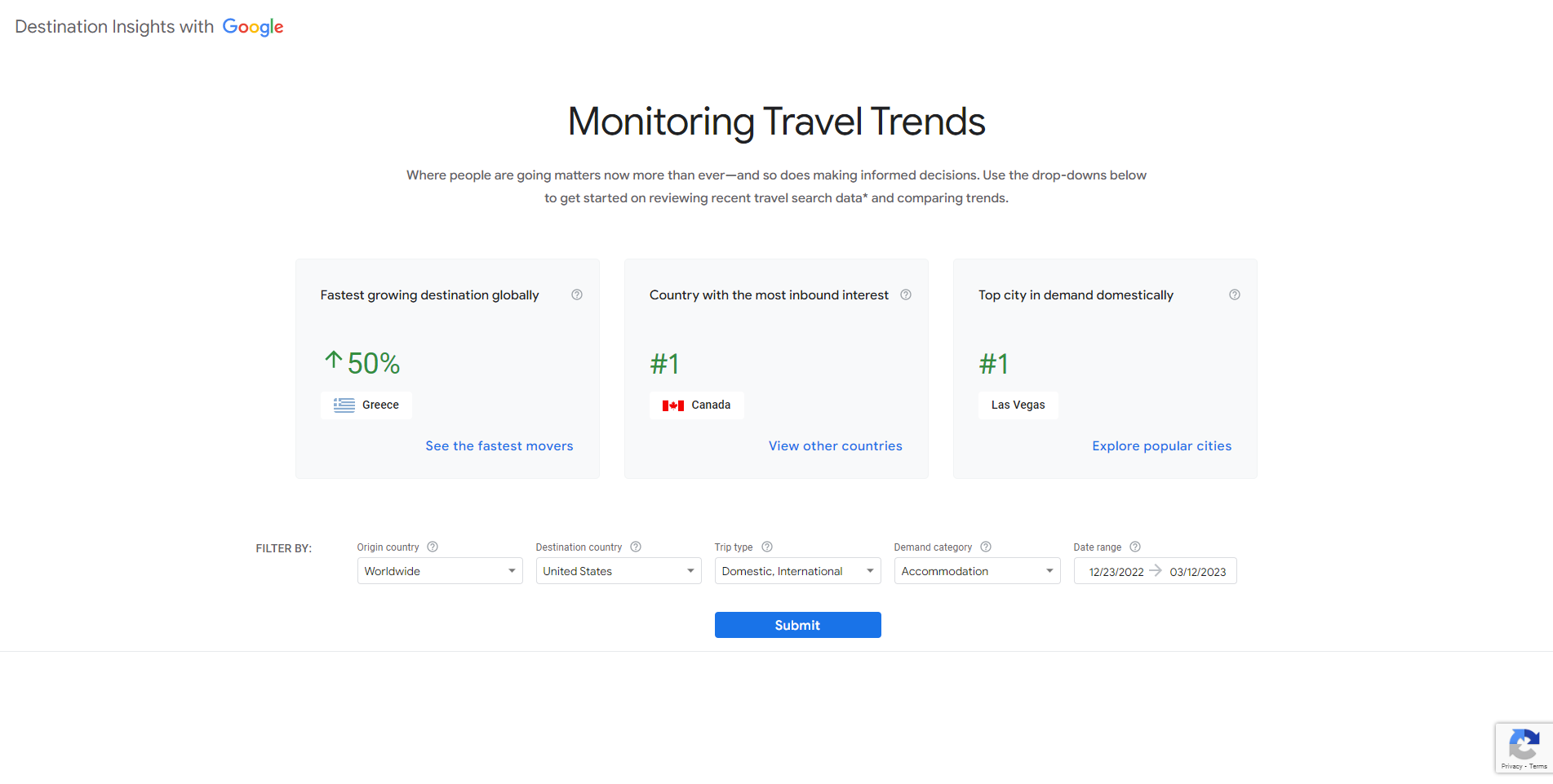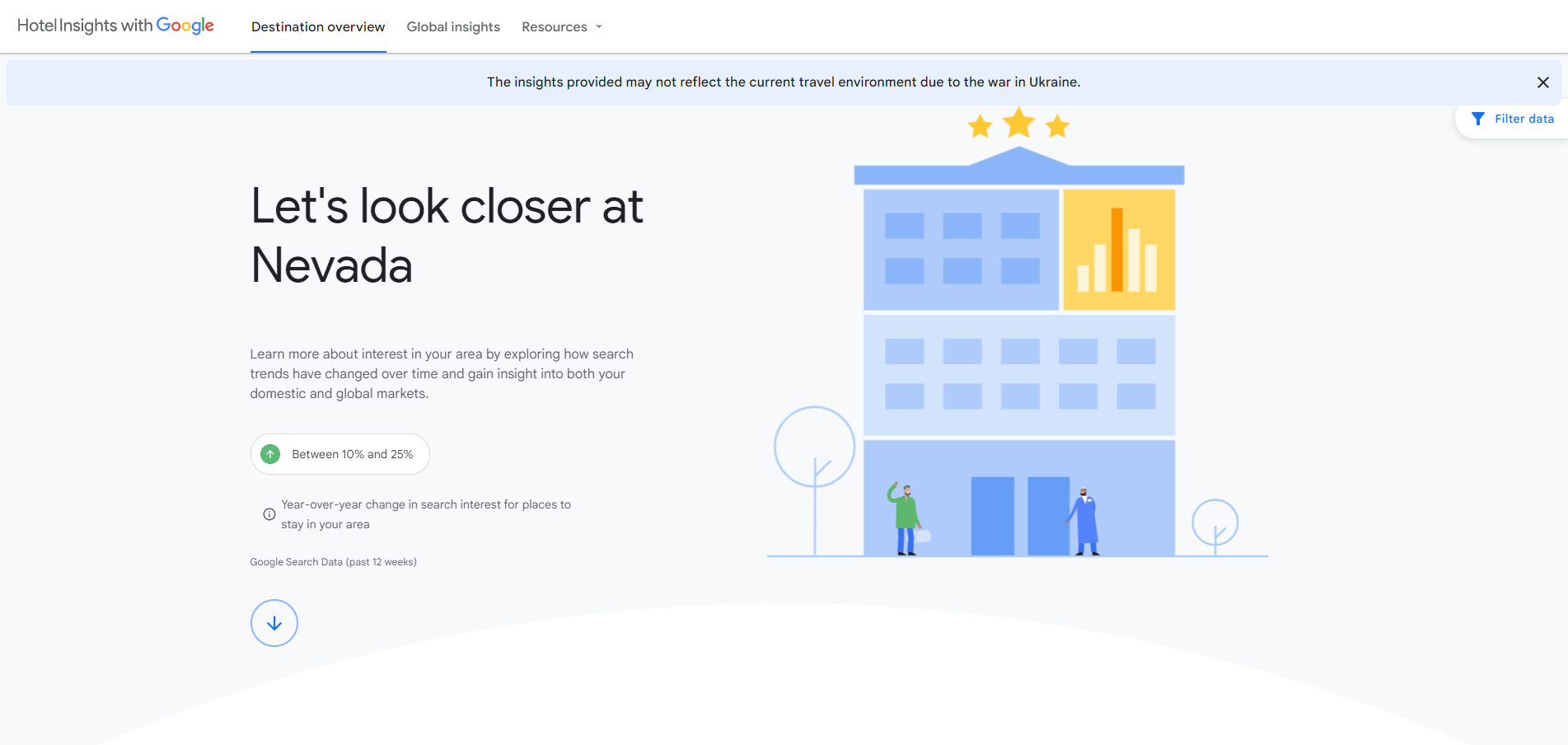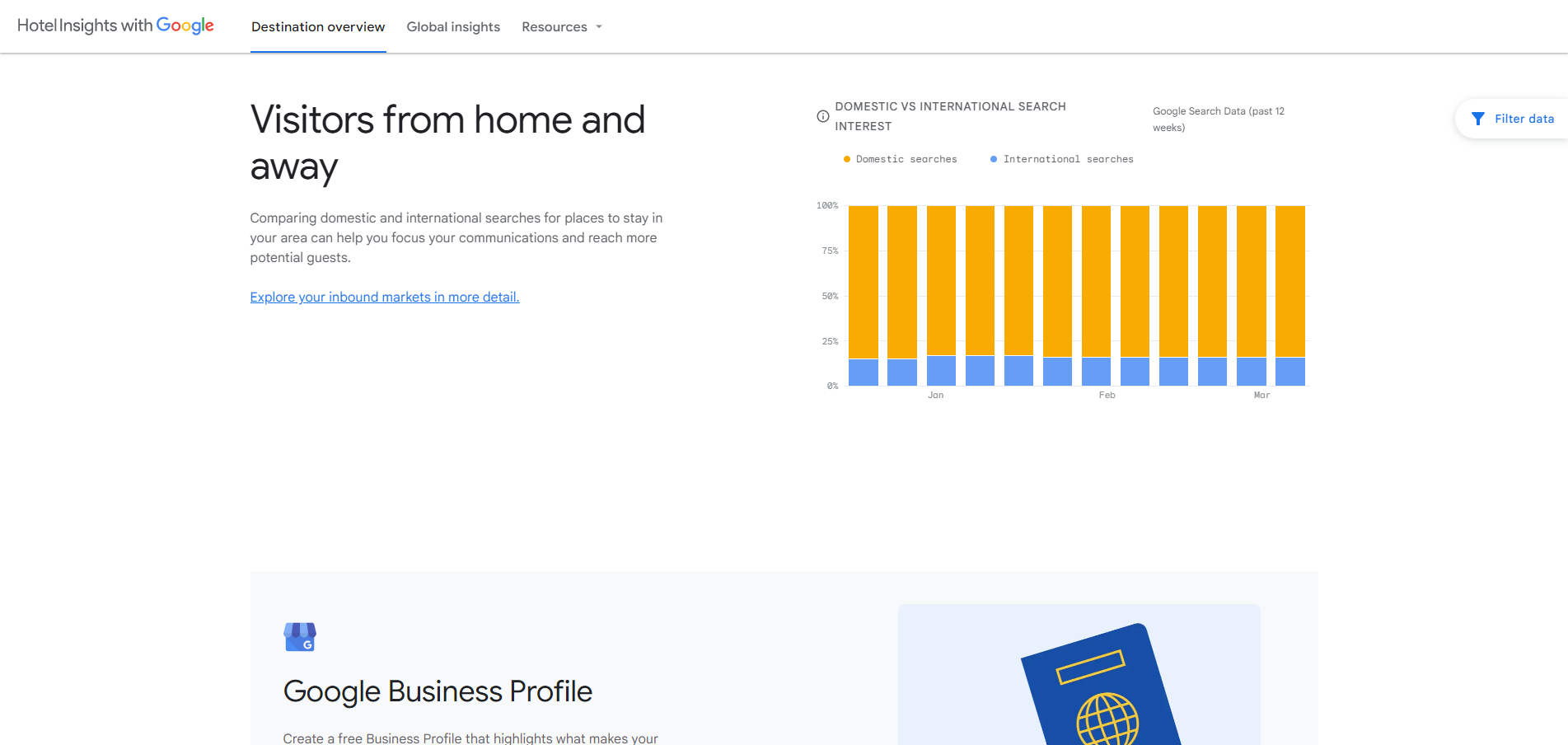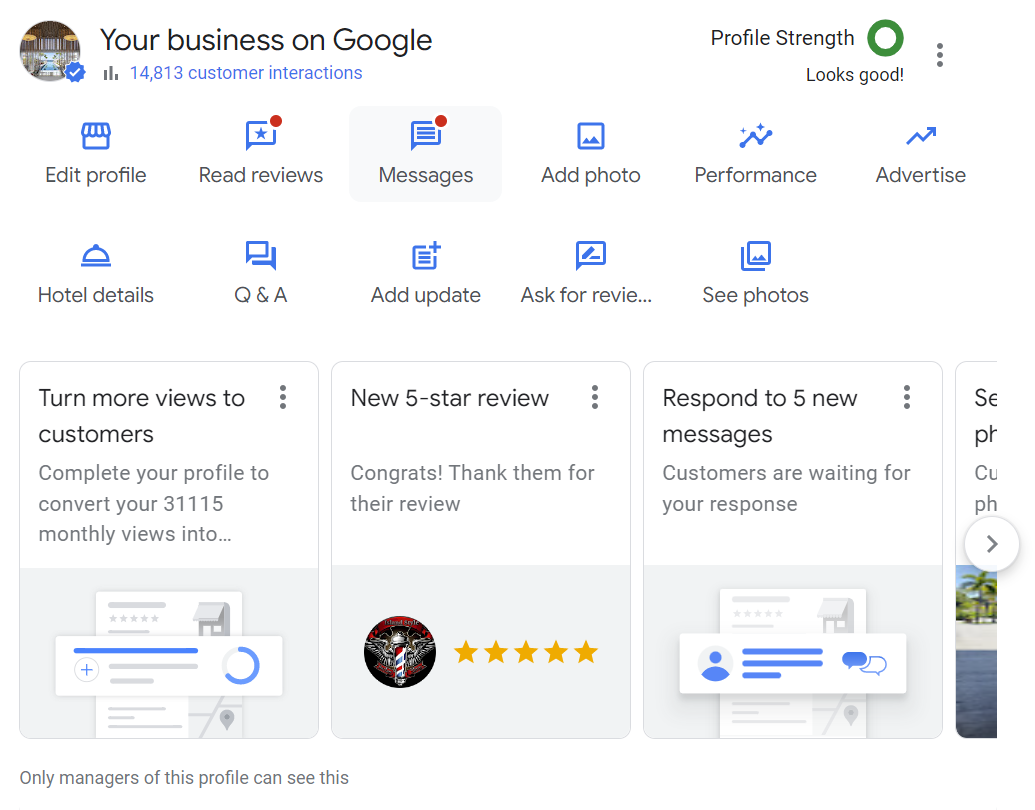While most Americans say they are comfortable traveling again, cost and inflation have now replaced COVID-19 concerns as top barriers to travel.
But the travel and tourism industry still continues to be highly competitive, with people starting to travel again, and hotels and chains vying for business against online travel agencies (OTAs) and booking sites.
Although the pandemic has eased up and travel is on the rise, consumer behavior has undergone a dramatic change.
Therefore, hotel brands must evolve their SEO strategies to drive incremental bookings, traffic, and revenue to attract travelers in the present and future by following the latest strategies, trends, and tactics – and employing the right tools in 2023 and beyond.
Prioritize Destinations Through Data
If you want to ensure you’re focusing your optimization efforts on locations that people are looking to travel to, look no further than Destination Insights with Google.
This handy tool gives you insights into the latest travel trends across the U.S. or internationally. You can also compare trends and focus on increasing your visibility for specific destinations.
 Screenshot from Hotel Insights By Google, March 2023
Screenshot from Hotel Insights By Google, March 2023For example, Las Vegas was the top destination in the U.S. from 12/23/22 to 03/12/23.
If I were working with a hotel like the Bellagio, I would make sure I am ranking on the first page for Las Vegas hotels, the brand, brand + geo keywords, restaurants, precautions, and other associated keywords.
Another great tool to provide insights for your SEO strategy is Hotel Insights by Google. It gives you data on who is searching to stay in your area, in addition to tools and tips to make your business stand out from the competition.
The data below is from Nevada, where consumers looking to book travel are up 10% to 25%, year over year (YOY).
 Screenshot from Hotel Insights By Google, March 2023
Screenshot from Hotel Insights By Google, March 2023
If you are a travel brand with locations in the Nevada area, this is a good insight to help you focus on destination pages.
Review existing content and your striking distance keywords for opportunities to build out or repurpose content with things to do nearby and events in the area. Also, make sure your local search is optimized.
Another excellent feature of this tool is that you can see if users are searching for this information from the U.S. or overseas. This could help you plan out your content strategy and PPC campaigns to target international travelers and reach even more potential guests.
 Screenshot from Hotel Insights By Google, March 2023
Screenshot from Hotel Insights By Google, March 2023
Satisfy Travelers’ Needs With A Brand Concierge Strategy
To satisfy travelers’ information needs and demonstrate Experience, Expertise, Authoritativeness, and Trustworthiness (E.E.A.T), brands should always provide high-quality, useful content.
When travelers consider booking a trip, they have various considerations, such as whether the destination appeals to them, nearby attractions, restaurant options, and dietary restrictions.
Many travelers conduct research months in advance, often relying on search engines for travel inspiration.
Hotels need to have an SEO brand concierge strategy to engage travelers throughout their user journey, as 95% of users from a Google/Bain survey continue to visit travel-related sites after booking.
Such a strategy should include a holistic content approach and a deep understanding of guest profiles, such as generational segments like Millennials and Boomers, and interest-based segments like adventurers and foodies.
For effective communication with individual travelers, hotels must provide content that is relevant to their interests and placed above the specific hotel destination – as well as within.
To rank well for search queries such as “foodie destinations” or “dining experiences around the world,” for example, a hotel brand’s website should have content that showcases the types of experiences that exemplify the purpose of a concierge.
This content should not only be about what the hotel offers but also cater to the specific needs of individual travelers.
For instance, recommending only the restaurant in the lobby may not be sufficient to satisfy a traveler’s needs. Brands must provide recommendations for external restaurants, what time the restaurants close, things to do in the hotel’s surrounding area, tourist attractions, the best travel routes, etc.
A brand concierge strategy requires completely rethinking hotel brand websites and their role in connecting with travelers through persona identification, journey mapping, and content.
It involves a comprehensive understanding of search, the connections between topics, and the intent stages of the queries made throughout the traveler’s journey.
Optimize Your GBP And Local Listings
By optimizing your Google Business Profile (GBP), your hotel listings can show up in the Map Pack in addition to being listed in the regular organic listings on the page for geo-modified keywords.
This can drive incremental revenue, bookings, and organic traffic.
Fully optimized listings help prioritize your business to ensure your hotel listings are at the top of local searches and provide a consistent customer experience to drive bookings and retention.
Here are my top tips to do just that:
- Optimize your listings across key search engine directories. Create Google Posts and optimize photos, so travelers can see the hotel.
- Manage and respond to reviews. Local reviews are considered the most useful content potential guests leverage when making their decisions. Respond to reviews to show you value your customers and the feedback they leave about your business. This is crucial because Google rewards businesses that respond to their reviews with higher rankings.
- Respond to Q&A and create an FAQ section so your hotel brand will be able to control the conversation about your business.
- Ensure your Google Maps pin is in the correct location so users can find your hotel.
- Show nice photos and videos of the hotel, rooms, and amenities like the restaurant(s).
- Use attributes to differentiate your location and provide additional details relevant to travelers about health and safety precautions, Wi-Fi, accessibility, etc.
- Always keep the hotel, restaurant, spa, and other hours updated so the user knows when they will open and close.
Also, Google updated the new search view, and it is important to become familiarized with the new dashboard.
Google will show you what you still need to do to complete your profile, whether that’s filling out details such as attributes, business description, website, phone number, address, etc.
 Screenshot from Google Business Profile, March 2023
Screenshot from Google Business Profile, March 2023
Work With Your Social Media Team
Share content about the most popular destinations, travel tips, hotel offerings, events, and nearby attractions.
This can help maximize visibility, build more brand exposure, and generate more links and buzz about your hotel, which can have a positive impact on your visibility, traffic, and revenue.
See Content Repurposing for Travel Brands: A Complete Guide for more tips and tricks to get the greatest mileage out of your content across platforms.
User Generated Content
User-generated content (UGC) such as reviews, photos, and videos can help travel brands improve their search engine rankings and attract more customers.
Encouraging customers to leave reviews and share their experiences on social media can help travel brands reach potential customers through the power of word-of-mouth marketing.
Video Marketing
Video marketing should also be an important part of your SEO strategy, as it’s an effective way for hotels to showcase their facilities and services to potential guests.
Videos can highlight amenities such as swimming pools, fitness centers, and restaurants, as well as show the rooms, views, and ambiance.
By creating a visual experience for the viewer, hotels can capture the attention of potential guests and make them feel more connected to the property.
Video marketing can also help build trust with potential guests.
Videos can feature testimonials from past guests or employees, which can help to build credibility and trust in the brand. They can also showcase the hotel’s commitment to cleanliness and safety, which is especially important in the current environment.
Video marketing is more engaging than other types of content, so it’s no surprise that the format is popular with both brands and consumers. Videos can also be shared on social media, which can help to increase engagement and reach a wider audience.
Promoting videos can give hotel brands a competitive advantage in the market. By creating high-quality video content that showcases their property and services, hotels can differentiate themselves from competitors and attract more bookings.
Optimize For Core Web Vitals
In a competitive industry like travel and tourism, it’s important to optimize your site for Core Web Vitals (CWV).
These three combined metrics are used to measure a website across a series of key performance indicators that became a ranking signal in May 2021. They include:
- Largest Contentful Paint (LCP): How long it takes for the main part of a webpage to load.
- First Input Delay (FID): How long it takes the webpage to become interactive.
- Cumulative Layout Shift (CLS): How much the webpage layout moves around when loading.
In order to improve on CWV, hotel sites should have clean code, use a CDN for heavy images, externalize JS and CSS, and be mobile-friendly and secure, etc.
There’s no penalty for not optimizing to CWVs, but it could be the factor to give you the boost that moves you past tough competitors.
Leverage FAQs And Be Ready For Voice
Your potential guests are asking questions, and your hotel brand should have the answers.
Place FAQs on your site to help current and future guests find the information they need, which can also help minimize calls to the hotel.
The FAQs should be marked up with structured data so they will show up in rich results and maximize organic search potential.
With consumers using voice search, your content must be optimized for voice search as well:
[Hey Google, does the Hilton in New York have a swimming pool?]
If your brand comes up as a response to a voice search query like this, it can help influence whether a user decides to book with your hotel.
Monitoring Competitor Visibility And Performance
The way consumers search for hotels has changed. That’s why it’s important to always monitor your competitors’ rankings and see:
- What content they are building.
- What market share they own.
- What new SEO strategies they are trying.
- How they are getting links.
- And how fast their pages load, etc.
From there, figure out what tactics and strategies you can glean that may be worth testing out.
Sometimes brands do not like to add content to their sites because they don’t want to interfere with the user experience. But the odds are pretty good that your competitors are adding content.
And if you find one of your biggest competitors has added content to a key destination page, the content has FAQs, it is marked up with structured data, and they now rank on the first page for a key destination term – they’re potentially getting incremental bookings, improving brand awareness, etc.
That’s why it may be worth building out and promoting content to keep up with, and even outperform, the competition.
In Conclusion
With the pandemic easing up, people are starting to travel again, and the travel and tourism industry is once again on the upswing.
For hotel brands, it’s crucial to have optimized Google Local listings, a concierge strategy, FAQs, and a website that’s optimized for Core Web Vitals. Beyond this, you must create useful and helpful content which – in conjunction with a sound SEO and PPC strategy – will put you in front of customers who are looking to book a trip.
If not, your competitors and OTAs will take away valuable search engine real estate and drive more incremental visibility and sales than your brand.
More resources:
- 10 Of The Best Social Media Marketing Strategies For Hotels
- Improve Rankings With This Off-Page SEO Checklist For Restaurants
- SEO for Beginners: An Introduction to SEO Basics
Featured Image: Pixel-Shot/Shutterstock





![AI Overviews: We Reverse-Engineered Them So You Don't Have To [+ What You Need To Do Next]](https://www.searchenginejournal.com/wp-content/uploads/2025/04/sidebar1x-455.png)